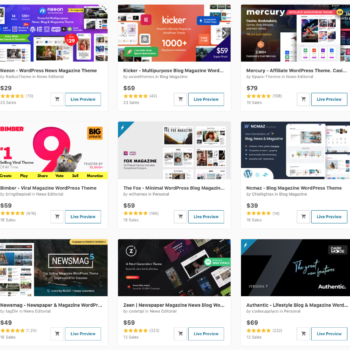Why No One Reads Your Blog, You Ask?
You’ve put in hours of work. You’ve followed the advice of the gurus, but still not getting any traffic? Are you constantly asking yourself why no one reads your blog?
You have been publishing blog posts week in and week out for months, but nothing seems to work.
Bounce rate is through the roof, hardly any visitors, no comments. It happens to every blogger out there at least once in their blogging journey.
All the excitement and motivation just goes down the drain as soon as you realize no one is reading your blog. Why is that? What’s happening to your blog, and how are you going to change that?
That’s what this post is all about. Addressing the most probable causes of your ghost town, as well as giving you some suggestions on improving your blog to give your posts the attention that they deserve.
Blog Has Too Many Topics
If you’re a hobby blogger and covering ten topics makes you happy, then do you.
But if your intention with your blog is to make money, then it’s highly recommended that you niche down and establish yourself as an authority of one particular area.
Website Speed is Slow
Make sure that your site loads quickly
Yes, this means that your site needs a fast load speed. It’s not just about how many images you have and how high your resolution is, but it’s also about speed.
Google ranks fast sites higher in the SERPs than those that take a long time to load, and they tend to give you more bounce traffic as people come and go.
It’s essential to keep your image size in check. Most smartphones today can view it easily.
Your WordPress theme must be lightweight, and you need to make sure that your host is lightning fast. A fast loading site is a must, and if your site is slow, it won’t rank high in Google no matter how great your content is.
Headlines aren't Enticing
This is the number one reason why people click on blog posts. It could also be the number one reason why no one reads your blog. It doesn’t matter how great your content is or how beautiful your images are. If you don’t write headlines that appeal to people, you’re not going to get the traffic that you want.
Important things to remember, unless you’re a celebrity, the content you write should be geared to either educate or entertain your audience.
If you’re a travel blogger and want to show off your amazing trip to Tokyo, then your blog posts should be written in a way that benefits the reader.
- 11 Must-Know Customs Before traveling to Tokyo
- My Trip to Tokyo, Japan: Living my Best Life Ever!
Which one seems more appealing?
If you would like to increase your blog traffic, learning how to craft catchy and compelling headlines is a great place to start.
Not Targeting Keywords
If your articles aren’t ranking on Google, then you might have a keyword issue.
Not using keywords at all
If you’re not using keywords, then this could play a large factor why you’re not getting the traffic you want. While creating great content is king, keywords might be next in line for the throne.
Keywords let the search engines know what your blog post about. Again, Google is all about search intent. Its mission is to serve the most relevant information back to the user. And keywords plays a big factor when determining relevancy.
Going after competitive keywords
Another issue could be that you are performing keyword research, but you’re going after keywords that you can’t rank for because you simply don’t have the domain authority yet.
As we would all love to rank for the big keywords that bring in a flood of traffic, you have to play the game by the rules.
You have to start at the bottom and slowly work yourself to the top by proving yourself to the search engines that your content is worthy to rank for more competitive keywords.
Blog Posts Aren't Formatted
If you’re wondering why no one reads your blog and you publish walls of text on your blog, please get download the blog post template checklist below.
Scannable
Short paragraphs
Not Publishing Consistently
Let’s face it. Being consistent at anything is tough! It doesn’t matter how easy the task, we all find reasons not to do it.
What you need to do is set yourself up for success. Creating a blog content calendar is a great way to not only keep you more consistent, but it will also keep you organized.
Low Domain Authority
Another very likely reason why your blog isn’t receiving much traffic or in some cases, none at all, is that your website has low domain authority.
Moz has a free domain SEO analysis tool that you can quickly check your domain authority score. The tool will also show you your top pages and ranking keywords.
No Internal / External Links
Part of optimizing your website for search engines is
Internal Links
External Links
Content is Too Short
Blog length
Not Enough Blog Posts
You haven’t published enough posts to get noticed by Google
A blog without posts is like a cake without frosting. It would be yummy, but no one would know what to do with it. Your blog needs content so that Google can rank your website for the keywords you want to rank for in search engine results pages (SERPs). Plus, content attracts readers. How do you get content? Write it! It takes time, practice, and patience. The more you write, the better you’ll become at it. Don’t worry if your first few attempts aren’t up to par. You’ll get better with time and practice.
Your Blog is Brand New
Building up a successful blog takes months and years.
While you’re on this journey, don’t expect to be on top of the SERPs right away. It takes time to climb that mountain. The more you practice writing and optimizing your posts, the better it will be. You may not see results right away, but you will start seeing people commenting and reading your content more and more. Blogging is a marathon, not a sprint. The first year is always the hardest, but you should start to see a steady trickle of visitors after you’ve been at it for six to nine months. It takes that long for each piece of content you create to rank in Google high enough to see any results.
Conclusion
Most of the reasons why no one reads your blog boils down to SEO. The more you optimize your blog for the search engines, the more traffic you’re going to receive.
Down below there is an SEO checklist that you can use to ensure that each of your blog posts are well optimized for Google and most importantly, for you, the readers.
If you’ve been blogging only for a short while, the best advice I can give you is to be patient and keep going. Implement what you’ve learned and to not give up. Just know that most every blogger has been in your shoes.
Take the time and go through your blog, see what needs improving, and get to work.









No Comments
Leave a comment Cancel